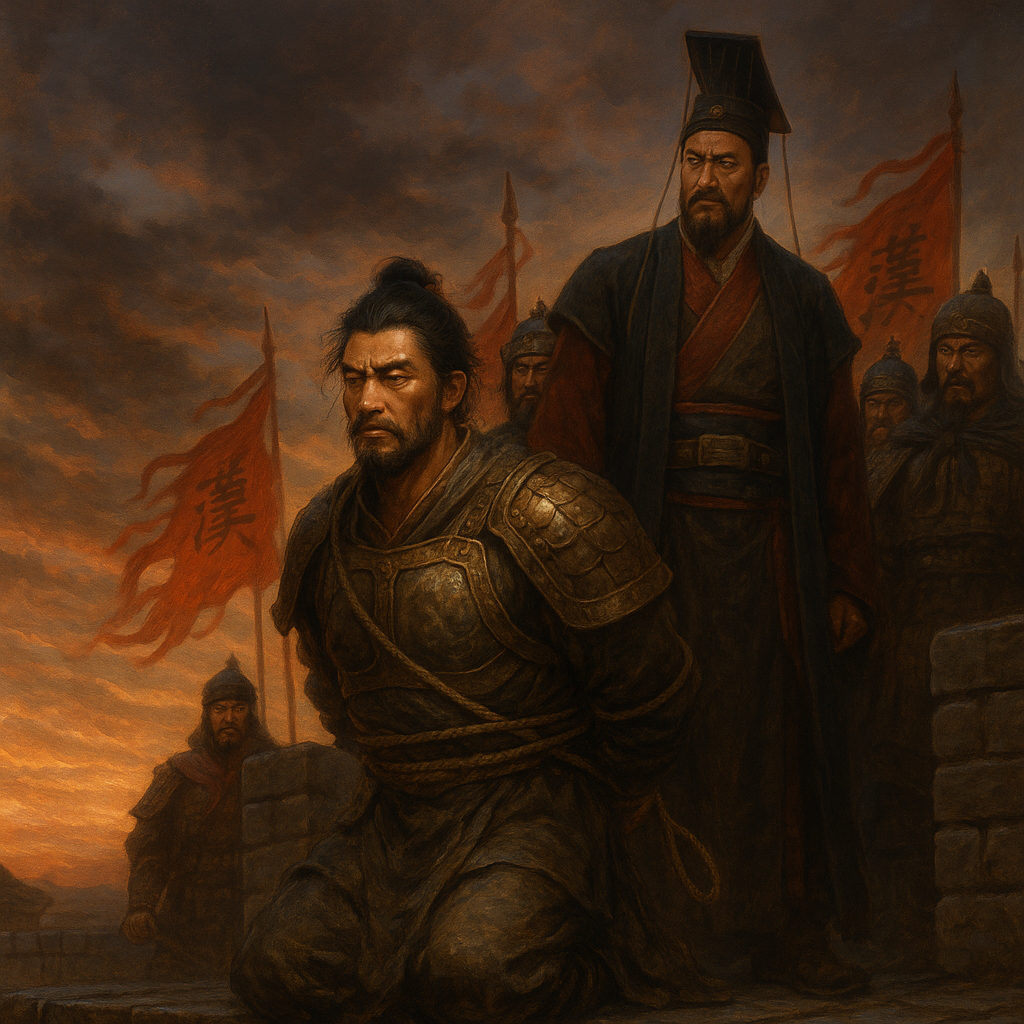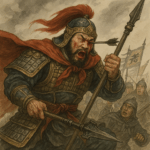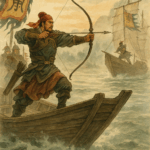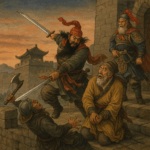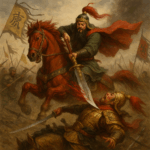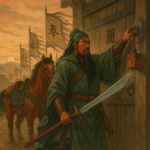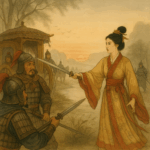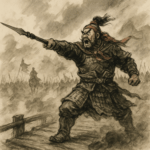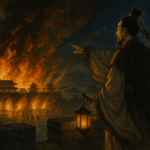Gao Shun led Zhang Liao to strike at Guan Yu’s camp, while Lü Bu himself attacked Zhang Fei’s position. Both Guan Yu and Zhang Fei sallied forth to engage him, and Liu Bei (“Xuande”) marshaled his forces on two fronts to support them. Lü Bu split his command and fell upon them from the rear, routing both armies. Xuande gathered a few dozen horsemen and made for Pei City. Lü Bu’s troops pursued hotly; Xuande urgently shouted to the city guards to lower the drawbridge, and Lü Bu arrived just in time. The defenders wished to rain arrows down on the enemy but feared accidentally striking Xuande, so Lü Bu seized the moment to storm through the gates. The city’s defenders were overwhelmed and scattered in all directions. Lü Bu ushered his troops inside. Realizing escape was impossible, Xuande abandoned his family and, mounted on a lone steed, dashed through the western gate and fled for his life. Lü Bu pressed on to Xuande’s home; there, Mi Zhu came out to meet him and said, “I have heard that a true man does not mistreat the families of others. The one competing with Your Excellency for supremacy is only Lord Cao. Xuande still remembers how you once spared him at the gate when he shot your spear; he does not dare betray you. Forced by circumstance, he must now submit to Cao, but he hopes you will show him mercy.” Lü Bu replied, “Liu Bei is an old friend—I would never harm his wife and children.” He then ordered Mi Zhu to lead Xuande’s family to safety in Xuzhou, while he himself marched his troops north into Yanzhou (modern Shandong), leaving Gao Shun and Zhang Liao to garrison Xiaopei. By this time, Sun Qian had already slipped out of the city beyond Cao’s lines. Guan Yu and Zhang Fei likewise gathered what men they could and withdrew to the hills.
Meanwhile, Liu Bei, riding alone, fled by a narrow path. Suddenly, someone galloped up from behind—it was Sun Qian. Liu Bei sighed, “My two brothers are missing; my wife and children are scattered—what am I to do?” Sun Qian advised, “Better to throw yourself on Cao Cao and await a chance for the future.” Accepting this counsel, Liu Bei made his way to Xuchang. Midway, his provisions ran out, and he begged food from every village—but everywhere people spoke ill of “Yuzhou Governor Liu,” refusing to share their rice. One day he reached a household and was granted lodging. A youth there called out, “Welcome—what is your name?” He was a hunter called Liu An. When Liu An learned the governor had arrived, he set out to find game for his guest. Failing to catch any, he gruesomely killed his own wife to serve as meat. At supper, Liu Bei asked, “What meat is this?” Liu An answered casually, “Wolf.” Liu Bei, unaware, ate his fill and retired. At dawn, as he prepared to mount his horse, he discovered a woman’s corpse in the kitchen with the flesh cruelly stripped from her arms. Horrified, he realized he had unwittingly eaten Liu An’s wife. Overcome with grief, he wept as he rode away. Liu An followed, saying, “I would have accompanied Your Excellency, but my aged mother must remain behind.” Liu Bei thanked him and departed, taking the road toward Liangcheng. Soon he saw a dust cloud blotting the sky—a large force was approaching. Recognizing Cao Cao’s army, he and Sun Qian rode straight to Cao’s banner, told him of Xiapi’s fall, the scattering of his brothers, and his own loss of family. Cao’s eyes filled with tears, and when he heard of Liu An’s atrocity, he sent Sun Qian off with a hundred taels of gold to recompense the poor man.
When the combined army reached Jibei, Xiahou Yuan greeted Liu Bei into camp and informed him that Lord Cao’s elder brother Xiahou Dun had lost an eye in battle and was bedridden. Cao Cao visited his wounded comrade, then sent him back to Xuchang to recuperate. Meanwhile, Cao dispatched scouts to learn Lü Bu’s whereabouts. A rider returned, reporting, “Lü Bu has joined forces with Chen Gong and Zhang Yang, leading the mountaineer rebels of Taishan to attack the commanderies of Yanzhou.” Cao Cao ordered Cao Ren to take three thousand troops to besiege Pei City, while he himself raised the main army and set out with Liu Bei to confront Lü Bu. Traveling east into Shandong, they neared Xiao Pass and ran headlong into Taishan rebels under Sun Guan, Wu Dun, Yin Li, and Chang Xi—over thirty thousand strong—blocking their way. Cao Cao sent Xu Chu to lead the vanguard. Xu Chu fought furiously but was forced to retreat; Cao Cao seized the initiative to press the assault, driving them back to Xiao Pass. Scouts dashed back to warn Lü Bu.
Lü Bu, having returned to Xuzhou, planned with Chen Deng to relieve Xiaopei. He left Chen Gui in charge of the capital. As Chen Deng prepared to depart, Chen Gui cautioned him, “Cao Cao once entrusted the affairs of the east to you; now if Bu is defeated, seize your chance.” Chen Deng replied, “I will tend to outside matters myself; if Bu returns in defeat, Father and Mi Zhu can hold the city and refuse him entry, and I will find a way to slip out.” Chen Gui warned, “But Lü Bu’s wife and children remain here; what then?” Chen Deng smiled, “I have a plan.” He entered Lü Bu’s presence and said, “Xuzhou is beset on all sides; Cao’s forces will strike hard. I suggest moving our grain and treasure to Xiaopei—if Xuzhou falls, supplies will remain there to save us.” Lü Bu approved, saying, “Master Long’s counsel is wise. Let us relocate the family and provisions at once.” He ordered Song Xian and Wei Xu to escort the convoy to Xiaopei, then led his army with Chen Deng toward Xiao Pass. Halfway there, Chen Deng said, “Allow me to scout the enemy’s strength; then Your Excellency may advance.” Lü Bu agreed, and Chen Deng rode on alone. He met with Chen Gong and others and reported, “My lord is angry that you refuse to advance to his aid—soon he will chastise you.” Chen Gong replied, “Cao’s forces are powerful; we should hold these passes and urge His Excellency to fortify Pei—that is our best course.” Chen Deng pledged obedience. At dusk he approached the ramparts and saw Cao’s army poised below. Under cover of night he wrote three letters, tied them to arrows, and shot them over the walls. The next morning he bade farewell to Chen Gong and galloped back to Lü Bu, reporting, “Sun Guan and the others inside the pass wish to betray us. I have left Chen Gong as an ally; at dusk Your Excellency should strike.” Lü Bu said, “If not for you, the pass would not stand.” He sent Chen Deng with light cavalry to the pass, signaled by fires with Chen Gong inside. That night Chen Gong and his men slipped out; Lü Bu led his soldiers in under cover of darkness. As they fought in the blackness, Cao’s troops saw the signal fires, surged in, and attacked, scattering Sun Guan and his men. Lü Bu fought until dawn before realizing he had been outwitted; he and Chen Gong retreated to Xuzhou. Arriving at the city gate, they were met by a rain of arrows. Mi Zhu, atop the enemy tower, called out, “You stole our lord’s capital; you shall never enter it again!” Enraged, Lü Bu demanded, “Where is Chen Gui?” Mi Zhu answered, “I have killed him.” Lü Bu turned to Chen Gong, “What of Chen Deng?” Chen Gong rebuked, “Do you still question me in your folly?” Lü Bu ordered a search, but Chen Deng was nowhere to be found. Chen Gong urged Lü Bu to fall back on Xiaopei, and Lü Bu relented.
As they retreated halfway, they saw a force riding up—it was Gao Shun and Zhang Liao. Lü Bu asked what was happening; they said, “Chen Deng brought word that Your Excellency is besieged and sent us quickly to relieve you.” Chen Gong warned, “This too is the traitor’s scheme!” Furious, Lü Bu cried, “I will kill this rogue!” He spurred his horse toward Xiaopei, only to find Cao’s troops flying their banners over the walls—Cao Ren had already captured the city. Lü Bu cursed Chen Deng from below. Chen Deng replied from the battlements, “I am a servant of the Han—I would never serve you, traitor!” Infuriated, Lü Bu prepared to assault the walls, when behind him came a cry—Zhang Fei had arrived with fresh troops. Gao Shun met Zhang Fei but could not break his line. Lü Bu charged into the fray. As they fought, Cao Cao himself joined the attack. Overmatched, Lü Bu drew back eastward; Cao’s soldiers pursued. Exhausted, Lü Bu was cornered by another force: leading them was Guan Yu, sword drawn, calling, “Lü Bu, do not flee—Guan Yu awaits you here!” Panicked, Lü Bu turned to fight him, but Zhang Fei arrived behind him. Seeing no escape, Lü Bu and Chen Gong hacked their way through a path and fled toward Xiaopei; Hou Cheng met them with a relieving force and escorted them away.
Guan Yu and Zhang Fei reunited, tears flowing as they recalled their separation. Guan Yu said, “I camped along the coast road and learned of your plight; hence I came.” Zhang Fei added, “I stayed near Mangdang Mountain these past days; today we are fortunate to meet.” After their reunion, they rode to Liu Bei’s camp, wept, and prostrated themselves. Liu Bei, overcome with emotion, introduced them to Cao Cao, then followed him back into Xuzhou. Mi Zhu received them and reported that Liu Bei’s family was unharmed—Liu Bei rejoiced greatly. Chen Gui and his son also came to pay homage to Cao Cao, who held a grand banquet for all his generals. Cao sat in the center, with Chen Gui to his right and Liu Bei to his left; the other officers were seated in order. After the feast, Cao Cao praised Chen Gui and his son, granting them the income of ten counties and appointing Chen Deng as General Fubo.
Having secured Xuzhou, Cao Cao planned to strike at Xiaopei. Cheng Yu warned, “Lü Bu now holds only Xiaopei; if we press too hard, he may fight to the death and join Yuan Shu—a dangerous prospect. Better to station capable commanders along the Huaihunan route to guard against both Lü Bu internally and Yuan Shu externally. Besides, Taishan rebels like Zhang Yang have not yet submitted; we must not ignore them.” Cao Cao replied, “I will take the Shandong routes; let Liu Bei guard the Huaihunan route.” Liu Bei respectfully accepted. The next day, Liu Bei left Mi Zhu and Jian Yong in Xuzhou, and, with Sun Qian, Guan Yu, and Zhang Fei, took position along the Huaihunan route. Cao Cao himself led the main army to besiege Xiaopei.
In Xiaopei, Lü Bu, confident in his ample supplies and the natural defense of the Si River, resolved to hold fast. Chen Gong urged, “As Cao’s army approaches, we should sally forth before his fortifications are set—and victory is certain.” Lü Bu, fearful from his recent defeats, refused. Days passed and Cao’s fortifications tightened. One morning Cao Cao called up to the walls, “Lü Bu, I have heard you seek marriage with Yuan Shu. I lead this army to stop your alliance with a traitor. You helped overthrow Dong Zhuo and earned merit for the Han—why now betray your past service? If you surrender now, we can jointly support the emperor and you shall not lose your rank. If the city falls, you will rue it too late.” Lü Bu answered, “You withdraw for now; let me consider.” Chen Gong spat insults at Cao Cao, and an arrow from the wall struck Cao’s banner. Cao, incensed, vowed vengeance and began the attack.
Chen Gong counseled again: “Cao’s provisions will dwindle; let Your Excellency lead your finest troops out to attack his rear, while I hold the city. If he besieges, I will strike from behind; if he attempts an assault, you can relieve me. In less than ten days his supplies will run out and we can break the siege.” Lü Bu assented and prepared to don his armor and lead an expedition. That winter, he sent an order for all retainers to bring winter cloaks. Lady Yan asked, “Where do you intend to go?” Lü Bu explained Chen Gong’s plan. Lady Yan wept, “If you leave and don’t return, how will I survive? You once abandoned me in Chang’an—now you propose leaving me again?” Lü Bu hesitated for three days. Chen Gong urged him again, “Cao’s army now encircles the city; if you delay, we will perish.” Lü Bu replied, “I prefer to stand firm within.” Chen Gong said, “Cao’s grain is scarce; scouts to Xuchang will soon return. You should strike his supply line—this is brilliant.” Lü Bu, swayed, again confided to Lady Yan. She wept and pleaded him not to go. Distraught, Lü Bu consulted his consort Diao Chan, who urged, “For the sake of our union, do not risk your life.” Lü Bu declared, “Fear not—I have my spear and my Red Hare; who can challenge me?” He then told Chen Gong he would not venture out, believing Cao’s threats a bluff. Chen Gong despaired, “We shall die with no burial.” Thus Lü Bu stayed within, spending day after day drinking with Lady Yan and Diao Chan.
The strategists Xu Si and Wang Kai visited Lü Bu and advised, “Yuan Shu in Huainan is still powerful. You once promised marriage to his daughter—why not renew that alliance? Should his troops come, we could trap Cao between two fronts.” Lü Bu agreed and had letters drawn up that day. Xu Si said, “We will need escort troops to push through.” Lü Bu ordered Zhang Liao and Hao Meng to take a thousand men and lead the way out. That night, they slipped past Liu Bei’s camp, and by dawn had emerged from the pass. Hao Meng remained with Xu Si and Wang Kai to cover them. Zhang Liao turned back and returned to the pass, only to be confronted by Guan Yu who barred the gate. Before fighting erupted, Gao Shun rushed out to their aid and escort them back inside.
Xu Si and Wang Kai reached Shouchun, presented their letters to Yuan Shu, and explained, “Lü Bu’s plight at Xiaopei is Cao Cao’s cunning—he seeks to trap Bu.” Yuan Shu replied, “Previously your lord killed my envoy and reneged on our marriage. Why should I aid him now?” Xu Si pleaded, “Without your rescue, Huainan and Xiapi alike will fall—our fortunes are bound.” Yuan Shu said he would send his daughter to cement the alliance, then raise an army. Reluctantly, Xu Si and Wang Kai departed, returning toward Xuzhou. They planned to slip under cover of darkness past Liu Bei’s camp. When they passed Liu Bei’s camp at midnight, Xu Si and Wang Kai went ahead, but Hao Meng was intercepted by Zhang Fei, captured, and his five hundred men scattered. Zhang Fei brought Hao Meng before Liu Bei, who in turn presented him to Cao Cao. Hearing Hao Meng’s plea to fulfill the marriage pact, Cao Cao flew into a rage, executed him at the camp entrance, and posted orders that any who revealed Lü Bu’s movements would be put to death. The garrisons trembled at these orders. Liu Bei returned to his camp and cautioned Guan Yu and Zhang Fei, “We hold the Huaihunan pass—remain vigilant and obey Cao’s commands.” Zhang Fei grumbled, “We captured a traitor general and yet were punished—why?” Liu Bei answered, “Cao leads many armies; without order his forces cannot be disciplined. Do not question him.”
Meanwhile, Xu Si and Wang Kai returned to Lü Bu and told him Yuan Shu demanded the princess before sending aid. Lü Bu asked, “How shall we deliver her?” Xu Si replied, “Hao Meng’s capture has alerted Cao—only if you personally escort her can she get through.” Lü Bu agreed, “Then I will go myself.” Xu Si advised, “Tomorrow at the double hours of Xu and Hai (7–11 p.m.) is auspicious.” Lü Bu ordered Zhang Liao and Gao Shun, “Take three thousand cavalry and a small chariot; I will ride with the princess. You two will escort her the remaining two hundred li.” At the second watch that night, Lü Bu wrapped the princess in soft blankets and ironed armor around her, strapped her to his back, and opened the city gates. He led the way, Zhang Liao and Gao Shun following. As they neared Liu Bei’s camp, a drum sounded and Guan Yu and Zhang Fei blocked their path, shouting, “Halt!” Lü Bu, unwilling to fight his sworn brothers, pressed on to break through; Liu Bei led troops to intercept. In the mêlée Lü Bu, encumbered by the princess, hesitated. Then Xu Huang and Xu Chu charged in, and all around shouted, “Do not let Lü Bu escape!” Lü Bu, now trapped, was forced back into the city. Liu Bei held his ground; Xu Chu and Xu Huang returned to their camps, having prevented any escape.
Inside the city, Lü Bu brooded, drinking heavily as Cao Cao’s siege dragged on two months without success. Suddenly word came, “Zhang Yang, Inspector of Henei, mustered troops at Dong Market to relieve Lü Bu—but his subordinate Yang Chou slew him, only to be killed in turn by Sui Gu, and the rebels scattered.” Upon hearing this, Cao Cao sent Shi Huan to execute Sui Gu. Gathering his generals he said, “Though Zhang Yang fell by his own hand, we still face Yuan Shao in the north and the indiscipline of our frontier. This protracted siege does us no good. Let us withdraw and regroup?” Xun You urged, “No—Lü Bu has already been beaten into submission; the morale of his army is broken, and Chen Gong’s counsel too slow. If we strike swiftly, Bu can be captured.” Guo Jia added, “I have a plan to break Xiaopei that is worth more than two hundred thousand troops.” Xun Yu asked, “Will it involve diverting the Yi and Si Rivers?” Guo Jia smiled, “Precisely.” Cao Cao beamed and ordered his men to breach the riverbanks. From the high ground, his army watched as floodwaters inundated Xiaopei—only the eastern gate remained above water. Messengers rushed to Lü Bu to report. Lü Bu scoffed, “My Red Hare can swim any channel—why fear?” He and his concubines drank lavishly that night, but the excess showed in his gaunt reflection the next day. Realizing his folly, he decreed all within the city who drank wine would be executed.
Meanwhile, Hou Cheng’s prized fifteen horses were stolen by men from the rear stables. Hou Cheng pursued and recovered his horses, prompting a celebration among the generals. He brewed five or six hu of wine and, fearing Lü Bu’s ban on alcohol, sent five bottles to the general’s residence with this note: “By your might, I recovered my horses. The others wish to celebrate, but dare not drink without your leave.” Lü Bu, enraged, ordered him executed for flouting his decree. Hou Cheng fell at his knees, pleading with Song Xian and Wei Xu to intercede. Lü Bu answered, “Disobedience merits execution. But for your comrades’ sake, I will spare you fifty strokes—then you may go.” The other generals were disheartened.
Song Xian and Wei Xu visited Hou Cheng’s home, where he wept, “Had you not been here, I would be dead!” They declared Lü Bu cruel. Hou Cheng replied, “His only love is for his family; he discards his soldiers like straw.” Song Xian said, “We will not die in this siege—let us seize Lü Bu and present him to Cao Cao.” Wei Xu agreed, “He is a warrior in name only. If we capture him, you must first steal Red Hare and bring it to Cao.” That night Hou Cheng crept into the stables, stole Red Hare, and dashed to Cao Cao’s camp. Wei Xu opened the gates, feigning pursuit. Hou Cheng brought the horse before Cao Cao and explained Song Xian and Wei Xu’s plan. Cao Cao then posted dozens of proclamations and had them shot into the city, reading:
“Generalissimo Cao, by imperial decree, commands the capture of Lü Bu. On pain of death, anyone who resists will be executed along with their family. From officers down to commoners, any who bring Lü Bu or his head will receive the highest honors.”
At dawn, cries shook the city walls. Lü Bu, shocked, summoned troops to the battlements. He ordered Wei Xu and Song Xian brought before him—both stood silently as he accused them. The city gates opened and Cao’s soldiers swarmed in. Wei Xu shouted, “Lü Bu has been captured alive!” Xu Hao remained skeptical until Song Xian pushed Lü Bu’s spear from his grasp. The gates opened fully and Cao’s troops poured in. Gao Shun and Zhang Liao, trapped at the western gate by floodwaters, were captured. Chen Gong fled to the southern gate but was taken by Xu Huang.Cao Cao entered the city and ordered the floodwaters drained and a general amnesty proclaimed. He then invited Liu Bei to join him on White Gate Tower. Guan Yu and Zhang Fei stood at their sides, presenting the captured officers. Though Lü Bu had once towered over the land, he now lay bound in ropes. He pleaded, “The knots are too tight—spare me a moment!” Cao Cao replied, “One cannot tame a tiger gently.” Noting Hou Cheng, Wei Xu, and Song Xian at his side, he asked Lü Bu, “How could you betray those who served you?” Lü Bu retorted, “I heeded the words of my wife and concubine, not traitorous counselors.” Cao Cao’s eyes glistened with reluctant admiration. He had Lü Bu’s coffin constructed and gave him a proper burial in Xuchang. In memory of Chen Gong, he wept and, after ordering that Chen Gong’s mother and wife be returned to Xuchang in safety, he had Chen Gong executed with due honors. Generals and commoners alike wept.
As Cao Cao led Chen Gong down from the tower, Lü Bu turned to Liu Bei and said, “You once sat as my honored guest; now I am your prisoner—why do you not speak a word on my behalf?” Liu Bei merely nodded. Cao Cao asked him, “How do you counsel?” Liu Bei replied, “Have you forgotten how Lü Bu spared me when I shot at him at the gate?” Lü Bu glared at him: “You are the most faithless of men!” Cao Cao ordered Lü Bu hanged. Lü Bu turned once more to Liu Bei: “Great General, I would side with you—together we could rule the world!” Liu Bei shook his head. As the executioner’s rope tightened, Lü Bu’s final words rang out, “Better to die bravely than live without honor!”